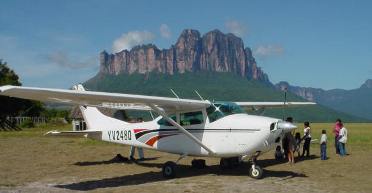An early-morning attack February 17 on Malabo, the capital of Equatorial Guinea, thwarted several Seventh-day Adventist church leaders' plans to visit the West African nation, postponing a rare opportunity to meet with church members in a country where Adventism was only established in 1986, local church leaders said.
A plane scheduled to fly three church executives from Cameroon to Malabo was cancelled Monday evening, February 16, a few hours before gunmen in motorboats attacked the capital, located on Bioko, an island off the west coast of Africa.
The group included Matthew Bediako, world church executive secretary; Rosa Banks, a world church associate secretary; and Gilbert Wari, Adventist Church president for West-Central Africa.
Initially frustrated because the trip had already been cancelled three times for various reasons, the church leaders later expressed gratitude that they were not stranded in the capital during the attack. All flights in and out of the Malabo airport were immediately grounded when shots were first fired, local church officials said.
Whether militants from the Niger Delta or unidentified mercenaries triggered the early morning firefight remains unclear, news reports said.
"I felt the Lord's guiding in keeping us out of Equatorial Guinea at this time," Banks said.
The group's stop in Equatorial Guinea was part of an 11-day tour of West-Central Africa meant to help church officials assess local members' needs and offer encouragement, Bediako said. Some 3,000 church members worship in 20 churches across Equatorial Guinea, a country of a half a million. Visits to Chad, the Congo and Gabon are also planned.
Bediako and Banks flew to Chad, with tentative plans to visit Equatorial Guinea rescheduled for later this month, Wari said. Relative calm returned to the capital after government armed forces quelled the attackers, but movements are restricted and the airport remains closed, said Allah-Ridy Kone, an Adventist pastor in Malabo.
As Africa's third largest oil exporter, Equatorial Guinea is a target for militants seeking to overthrow the government and hijack the country's rich offshore oil reserves. Ensuing conflicts have led to decades of volatility in the former Spanish colony.
Local church leaders report no loss of lives or damage to church property during the most recent attacks. Government forces killed at least one attacker, and another group drowned when the country's Navy sunk their speed boats, news agencies reported.
The majority of the inhabitants of Equatorial Guinea are Roman Catholics, followed by Protestants and a considerable number of Muslims. Protestant denominations including the Assemblies of God, Baptists, Methodists, Pentecostalists, Presbyterians and the Seventh-day Adventists. Also a Baha'i mission is located in the capital.

